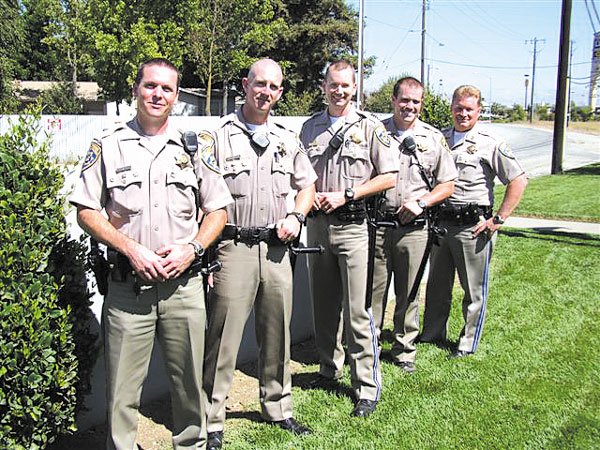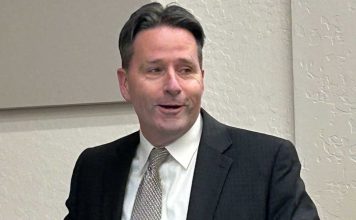At 14 years old, Otto Knorr knew he wanted to be a California
Highway Patrol officer.
By Lori Stuenkel
Gilroy – At 14 years old, Otto Knorr knew he wanted to be a California Highway Patrol officer.
While working at a gas station in Rancho Cordova, east of Sacramento, he often chatted with highway patrolmen who stopped by. Sometimes, he would perform an oil change while they waited. On one such occasion as Knorr worked on an officer’s car, oil dripped on the manifold and started a fire.
“The officer just quietly, calmly, professionally got out and put the fire out,” Knorr said. “And I just always looked at the highway patrol as, that was what I want to be. I have a great love for this department.”
Knorr, 48, joined the CHP when he reached the minimum required age of 21 years. He was attending the academy in Sacramento when the same officer whose car he scorched saw him and shook his hand, saying, “I’m so glad you made it,” Knorr said Wednesday.
Twenty-seven years later, Knorr – a captain – commands the CHP region headquartered in Gilroy. He replaces Capt. Bob Davies, who recently retired after 10-and-a-half years leading the region’s office. Knorr came to town in mid-June but officially took over the post Sept. 1.
“For me, this is the best job in the highway patrol – the fact that you have your own command and you’re responsible for it and it’s up to you to make it a success,” he said. “I probably have it easier than most commanders, because I did follow Bob Davies here, and let me tell you, Bob has got a great-running ship here.”
Knorr’s career has included stints throughout Northern California, starting in San Jose and leading two-and-a-half months ago back to the Gilroy/Hollister area. He was promoted to captain a year ago and having spent three years at CHP headquarters in Sacramento, asked for a a field commander position.
Although he’s a supervisor, he still loves the nitty-gritty duties of a highway patrolman.
“I wrote a ticket this morning,” he said – the driver was missing a front license plate and had expired registration.
The 37 officers covering the region – four of whom are new additions to the agency – are hard-working, motivated and truly work to serve the public, Knorr said.
One of his goals for officers these days is increasing citations to seat belt and car seat violators. At nearly every morning briefing he tells officers not to issue mere verbal warnings for the infractions.
“The public has been educated and they know the dangers. We need to start taking strong enforcement action for it,” he said.
He also wants to crack down on motorists wearing seat belts improperly, such as under the arm.
“To me, it’s easier to give a parent a citation than for the coroner to tell the parents their child is dead,” said the married father of one and grandfather of three.
Two 6-year-old girls were injured in a deadly crash on Pacheco Pass Highway last month. Six people had crammed into a car with five seats. Crashes involving children are among the most difficult for an officer to witness, and that three-car crash left local officers concerned about the girls, Knorr said. He drove up to the hospital and brought back pictures of the girls to put the officers’ minds at ease.
As an officer who specialized in arresting drunken or drug-impaired drivers for most of his career, Knorr has seen and even experienced numerous collisions through the years. He has totaled three patrol cars – one when a drunken driver rear-ended him and pushed his car into the back of another drunken driver Knorr was tailing.
He underwent five different surgeries for injuries sustained in other crashes. It’s all part of the job.
“I don’t think the public understands how many officers we lose or are injured every year because of drunk driving or because of stuff like that,” he said.
In his early years on the job, Knorr worked graveyard shifts and became skilled at identifying drivers under the influence. During his first stint in Woodland, he and his partner became certified in drug recognition to become more efficient at the job, he said. But he spent his late 20s in two specialty positions.
“I was happy doing the traffic enforcement, that’s what I joined the force for,” he said. “It just happened that way.”
For two years, he went undercover with a regional task force to bust dealers selling methamphetamine, cocaine, heroin, marijuana, and LSD.
The next three years he spent first as one of the CHP’s original 16 K9 officers. He estimates he has taken $80 million worth of drugs off the street during his career. Knorr was promoted to sergeant and served in Monterey and Stockton for two years each before returning to the Sacramento area, where he was promoted to lieutenant and then captain.
Joining him as newbies at the Gilroy station are Brent Townsend, Greg Houser, Mike Egan, and Toby Adrianse. The recent academy graduates are training with a veteran officer for 45 days, working all three shift rotations, all five area beats and all 26 road-specific beats.
With nearly three decades as a patrolman behind him, Knorr still bursts with enthusiasm when speaking about his job. Leaning against a wall in his Gilroy office, waiting to be mounted, is a frame containing the original “Badge of the CHP” CD single by actor Cliff Bemis.
“It bubbles you up, it gets you pumped, ready to go out there and do some good work for the highway patrol,” he said.














